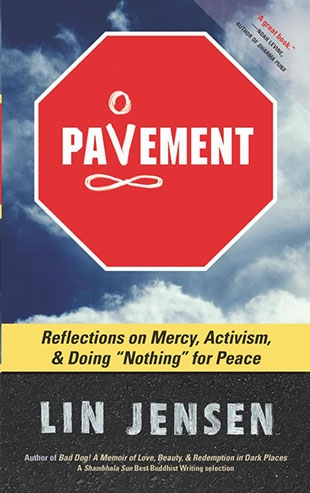"I'm a peace activist, and as such in my daily vigils I sit in some sort of ethical judgment that war is wrong. I have a need therefore to understand how I can claim to know the right or wrong of anything.
"Judgments of right and wrong are a nearly irresistible enticement to pick sides. And that's exactly why the old Zen masters warned against becoming 'a person of right and wrong.' It isn't that the masters were indifferent to questions of ethics (indeed moral and ethical teachings have always been a part of both Zen and Buddhism in general); it's just that they didn't find the source of ethical conduct in taking sides or even in the best ethical argument one might make. For these masters, the source of ethical conduct is found in the way things are, circumstance itself reveals what is needed.
"But circumstances are always of the moment and subject to a continual shifting about that requires a great tolerance for contradiction and reversal. As soon as I take a side on the right or wrong of anything, sides may have already shifted and I find my judgment in contradiction of itself. My mind is always urging me to resolve opposites, to settle on one side or the other. But it never works well that way. Life's much livelier than that.
"I've advocated for peace nearly the whole of my life, operating out of the conviction that resorting to violence is wrong, or if not 'wrong' in the stark ethical sense of the word, at least wrong in the great harm violence brings to our lives, the regretful suffering and hatred that follows in its wake. And yet I don't others to point out those contrary exceptions where the use of force appears warranted.
"One old Zen Master spoke of how even the surest thing gets 'turned about by the power of wind; in the end everything breaks down and disintegrates.' That nameless wind flows down the valleys of my life as well, a veritable storm come to dislodge me from all the fixed certainties and anticipated correspondences I might rely upon. Nothing is likely to ever turn out exactly as I think it might. In the end, even the most reasonable expectation breaks down and disintegrates.
"Whatever else I might hope for, the only world I know is at once circles and squares, violent and loving, unpredictable in its contrary capacity for kindness and cruelty. Anyone of us humans might very well pray for some lasting and comprehensible order in our lives, some saving consistency, an island of mercy amidst the savagery that lies all about. But for all our longing, it is the Dharma of contradiction that shows us how to keep peace with the world we actually have.
"The person of right and wrong for whom right is always right and wrong is always wrong lays waste to his surroundings. What's offered us in the place of moral certainty is doubt and love, which are ultimately, so intertwined as to be nearly synonymous. Doubt wears the hard edges off right and wrong, turning the soil where love sprouts like spring flowers. The old masters placed the site of ethics within the inward, instantaneous grasping of circumstances in their entirety, a living truth not divisible into categories of right and wrong. Truly, we can know things most directly when we lay no claim to knowing anything at all.”
